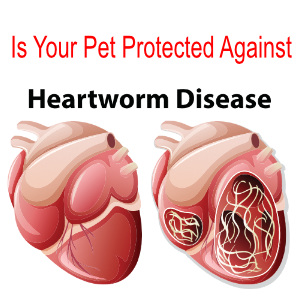What is Heartworm Disease?
Heartworm disease is a serious condition caused by a parasitic worm called Dirofilaria immitis. These worms are spread through the bite of an infected mosquito. Once inside a pet, the worms grow into adults, live in the heart, lungs, and blood vessels, and can cause severe health problems, including:
- Heart failure
- Lung disease
- Organ damage
- Death, if untreated
Dogs are the primary host for heartworms, but cats and other animals can also be affected. The disease is found in all 50 states, with higher prevalence in warm, humid areas where mosquitoes thrive.
Why is Heartworm Testing Important?
Regular heartworm testing is essential to keep your pet safe. Here’s why:
- Early Detection Saves Lives: Heartworm disease often shows no symptoms in its early stages. A simple blood test can detect the presence of heartworms before serious damage occurs.
- Ensures Safe Prevention: If your pet is already infected, giving heartworm preventive medication can be dangerous. Testing confirms your pet is heartworm-free before starting or continuing prevention.
- Protects Your Pet’s Health: Untreated heartworm disease can lead to irreversible damage. Regular testing allows for early intervention and treatment, improving outcomes.
- Peace of Mind: Annual or biennial testing (depending on your pet’s needs) ensures your pet is protected, especially in high-risk areas.
How Does Heartworm Testing Work?
Heartworm testing is quick and simple:
- For Dogs: A small blood sample is taken to check for heartworm antigens (proteins produced by adult worms). Results are typically available within minutes.
- For Cats: Testing may involve a combination of antigen and antibody tests, as cats can have fewer worms, making detection trickier.
We recommend annual testing for dogs and regular testing for cats, especially if they spend time outdoors or live in mosquito-prone areas.
Signs of Heartworm Disease
In the early stages, pets may show no symptoms. As the disease progresses, you might notice:
- Persistent cough
- Tiredness or reluctance to exercise
- Weight loss or reduced appetite
- Swollen abdomen (in severe cases)
- Difficulty breathing
If you observe any of these signs, contact us immediately for a heartworm test and evaluation.
Prevention is Key
The good news? Heartworm disease is preventable! Here’s how you can protect your pet:
- Year-Round Preventive Medication: Monthly heartworm preventives (chews, tablets, or topicals) are highly effective when given consistently. We can recommend the best option for your pet.
- Regular Testing: Even with preventives, testing ensures your pet remains heartworm-free and that the medication is working.
- Mosquito Control: Reduce your pet’s exposure to mosquitoes by eliminating standing water and using pet-safe mosquito repellents.
Treatment for Heartworm Disease
If a pet tests positive for heartworms, treatment is available but can be costly, complex, and physically demanding for the pet. For dogs, treatment involves multiple injections to kill adult worms, along with strict rest to prevent complications. Cats are harder to treat, as no safe treatment exists to eliminate adult worms, making prevention and early detection even more critical.
Take Action Today!
Protecting your pet from heartworm disease starts with a simple test. Schedule your pet’s heartworm test with us today, and let’s work together to keep them healthy and happy. If you have questions about heartworm disease, testing, or prevention, our team is here to help! Call us or book an appointment today.



